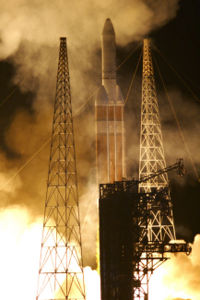Difference between revisions of "Delta IV"
| Line 7: | Line 7: | ||
The Heavy configuration (pictured) uses three Common Booster Cores (CBC) in parallel as its first stage, each mounting a single [[Rocketdyne]] [[RS-68]] hydrogen-oxygen engine. It has an LEO performance of approx. 23 tonnes, but this comes at a hefty price tag of between $250 million and $300 million per launch. | The Heavy configuration (pictured) uses three Common Booster Cores (CBC) in parallel as its first stage, each mounting a single [[Rocketdyne]] [[RS-68]] hydrogen-oxygen engine. It has an LEO performance of approx. 23 tonnes, but this comes at a hefty price tag of between $250 million and $300 million per launch. | ||
| − | The Delta IV has been phased out and is no longer in production. The last core was produces in 2023. The successor | + | The Delta IV has been phased out and is no longer in production. The last core was produces in 2023. The successor launch system is the Vulcan vehicle. |
==External Links== | ==External Links== | ||
Latest revision as of 12:00, 26 January 2024
The Delta IV series of launchers was developed by Boeing during the late 1990s as part of the US Air Force's Evolved Expendable Launch Vehicle program. It is now manufactured and launched by the United Launch Alliance consortium.
Several variants of the Delta IV exist in order to cater for a wide spectrum of civilian and military mission profiles; however, only the largest of these, the Delta IV Heavy would be of major interest for Mars mission planning.
The Heavy configuration (pictured) uses three Common Booster Cores (CBC) in parallel as its first stage, each mounting a single Rocketdyne RS-68 hydrogen-oxygen engine. It has an LEO performance of approx. 23 tonnes, but this comes at a hefty price tag of between $250 million and $300 million per launch.
The Delta IV has been phased out and is no longer in production. The last core was produces in 2023. The successor launch system is the Vulcan vehicle.







